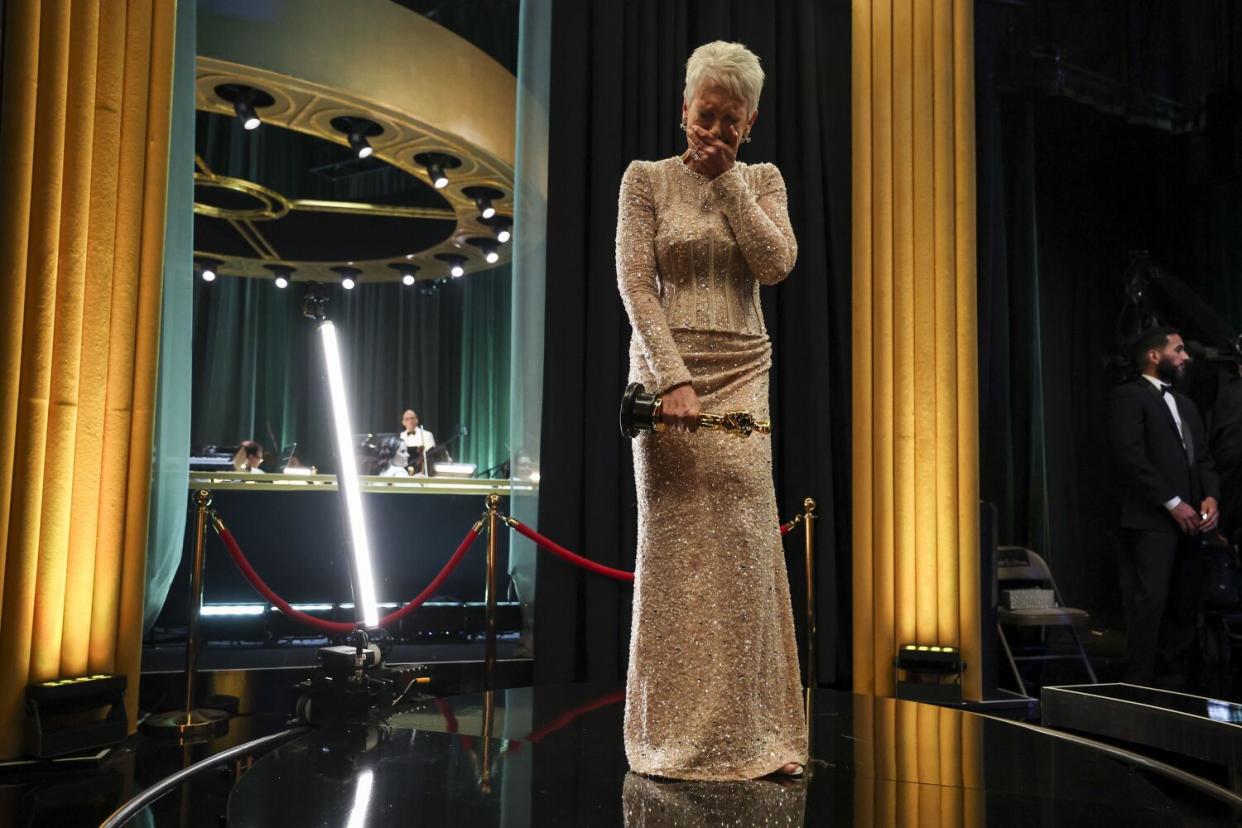Letters: U2 and the rock star conundrum

Great bands versus stardom
Regarding "U2 Is Still Out There Looking" [March 16]: The problem with great bands who become rock stars is the business apparatus of the label that tries to milk every dollar out of such stardom.
U2 took over the world with seminal tracks such as “With or Without You,” “I Still Haven’t Found What I’m Looking For” and “Sunday Bloody Sunday.”
They became obsessed about being popular, hence the “Pop Tour,” which gave me chills, in a bad way, when announced. Something and somebody’s got to pay for the mega mansions. Two nice tracks came out along the way, “One,” and “Beautiful Day,” for the liking of everyone.
The necessity of staying in business overwhelmed the necessity of producing something inspired and relevant. Too bad.
Michele Castagnetti
Los Angeles
Wide world of the Oscars
The Oscars may have made a misstep in not casting more South Asian dancers onstage [“Oscars Made a Misstep, Dancers Say,” March 17], but for me and my friends it was our first introduction to Indian folk dancing.
As a result, I have been streaming Bollywood films all week long.
Randy Farhi
Los Angeles
::
Thanks for your spread of articles and photos on the Oscars, starting with Justin Chang candidly sorting out what’s what and what might be what in all the prizes for “Everything Everywhere All at Once.”
Also, thanks especially for Mark Olsen's “Year of the Comeback” article highlighting the fact that the awards for acting all went to veteran actors including the remarkable Ke Huy Quan who pointed out that his long journey to the world stage of the Academy Awards began with him in a boat.
Lastly, thank you for the backstage photograph of Jamie Lee Curtis, Oscar in hand, breaking down.

I’m near her age and can’t tell why great and unexpected blessings make me weep. Maybe it has to do with the holding-our-breath some of us older people do as a way of life — then, something amazing suddenly comes around and our initial involuntary reaction is to catch up some on deep breathing.
Jill Peacock
Santa Barbara
Drag in American culture
Regarding “The Show Will Go On” [“March 15,”]: As a 75-year-old gay Christian man, I’m so happy one major political party is finally coming to our defense against icons like Milton Berle, Bob Hope, Jackie Gleason, Tony Curtis, Jack Lemon, Harvey Korman and Robin Williams, who all dressed in drag in some of their performances.
They certainly warped our American culture, right? (For those who don’t get it, please look up the word "satire," you may learn something useful.)
Richard J. Follett
Van Nuys
Roots of Salvadoran literature
As a Salvadoran American scholar of Latino literature for over 30 years, I have much appreciation for Christopher Soto's story [“Salvadoran Renaissance,” March 19]. No doubt, the talented Salvadoran American writers mentioned in the article have shined a new light on the U.S. literary landscape. However, the article’s contemporary approach disregards the influence of figures, publishers and movements that helped shape Salvadoran American literature into what it is today.
In 2009, for example, William Archila published “The Art of Exile,” the first poetry collection to give us insight into El Salvador’s civil war. It was part of the “Canto Cosas” series under Bilingual Review Press. Established by Francisco Aragón, that series (and publisher) coincidentally also allowed me to publish my first poetry collection.
Also, in 2001 Marcos Villatoro published “Home Killings: A Romilia Chacón Mystery,” which was named one of the best books of 2001 by the Los Angeles Times and was published by Arte Publico Press, a major publisher of Latinx books. Not by accident Red Hen Press, another brave, progressive publisher that supported Salvadoran American writers, would go on to publish both Archila and Villatoro’s other works (while Arte Publico would also publish my second poetry collection).
Also, in places like Washington, D.C., poets like Quique Avilés and Carlos Parada Ayala, through their performances and their writing, have brought El Salvador to the consciousness of thousands.
Jose Gonzalez
Quaker Hill, Conn.
Shipping terminology
The objects in the sculpture “Sleeping Figure,” reviewed by Christopher Knight [“A Witty Work's Pointed View at Desert X,” March 15], are intermodal containers, not “railway freight cars.” They are used interchangeably on railroads, trucks and aboard ships. Their lengths are standardized at 20 feet, 40 feet, 45 feet, 48 feet and 53 feet.
Jeff Olmstead
La Crescenta
More music coverage, please
I have subscribed to the L.A. Times consistently since 1967. As a music educator, practicing musician and music lover, I have enjoyed reading the music reviews in the Calendar section. I remember Martin Bernheimer’s thoughtful comments. I also appreciate Mark Swed’s observations. I am disappointed that The Times has largely stopped publishing music reviews.
Los Angeles is blessed with a world-class orchestra and outstanding conductor. My most recent concert experience was with Zubin Mehta conducting Crumb and Berlioz. This amazing concert was ignored by The Times as were most of the others.
It would seem that the music community in Los Angeles deserves to be recognized in our major newspaper. I hope that Los Angeles' rich music community will once more be a topic for The Times' Calendar section.
Rodney Oakes
San Pedro
This story originally appeared in Los Angeles Times.
